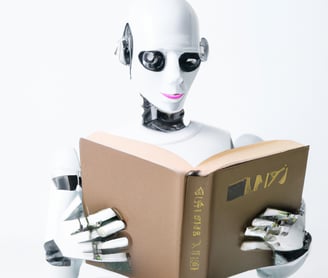Will artificial intelligence affect copyediting jobs?
The AI revolution is beginning. What does it herald for our profession?
PROFESSION
Lisa Barnes
12/13/20222 min read
Another way that AI will impact copyediting is by providing more personalized and relevant feedback. AI algorithms can analyze the writing style, tone, and content of the text to provide specific feedback on areas that need improvement. For example, AI tools can suggest alternative phrasing or wording to improve the clarity or coherence of the writing. AI algorithms can also analyze the intended audience and provide feedback tailored to their needs and preferences, such as language usage and cultural references.
AI can also help to enhance the collaboration between copyeditors and writers. By using AI-powered tools, copyeditors and writers can work together more effectively to refine the text, with AI providing real-time feedback and suggestions. This can lead to a more collaborative and efficient copyediting process, where the writer and copyeditor work together to produce high-quality content.
However, it is important to note that AI technology is not yet advanced enough to replace human copyeditors entirely. While AI tools can certainly help automate certain tasks, they may not always understand the context or intended meaning of the writing. For example, AI algorithms may suggest changes that do not align with the writer's intended meaning, or may miss subtle nuances in the writing that are important for conveying the intended message. In these cases, human copyeditors with their expertise and judgment, are still needed to provide a more comprehensive review and revision of the text.
In conclusion, AI will have a significant impact on the field of copyediting, bringing new opportunities and challenges. AI tools can automate routine tasks, provide more personalized and relevant feedback, and enhance the collaboration between copyeditors and writers. However, human copyeditors will still be needed to provide their expertise and judgment in the copyediting process, particularly for more complex and strategic tasks. As AI technology continues to evolve and advance, it will be important for copyeditors to adapt and incorporate these tools into their work processes to remain competitive in this rapidly changing industry.


Artificial intelligence (AI) has been rapidly advancing in recent years, and has the potential to revolutionize a wide range of industries, including copyediting. Copyediting involves reviewing and revising written content to improve its accuracy, clarity, and overall quality, and AI has the potential to greatly enhance this process by automating certain tasks and augmenting the abilities of human copyeditors. In this article, we will explore the ways in which AI is likely to affect copyediting and its implications for the future of this profession.
One of the main ways that AI will impact copyediting is by automating routine tasks. AI-powered tools, such as grammar and spell checkers, can quickly and accurately identify spelling errors, grammatical mistakes, and typos, freeing up copyeditors to focus on more complex and strategic tasks. This can greatly increase the efficiency of the copyediting process, allowing copyeditors to handle a greater volume of work in a shorter amount of time. In addition, AI tools can analyze large amounts of data, such as text from a vast database of previously published content, to identify patterns and suggest improvements to the writer.
Our Address
(United Kingdom)
Innovord Solutions (P) Ltd,
1st Floor, 11/457, 'Anjali'
Railway Station Road
Tripunithura, Kochi
Kerala, India
Our Address
(India)
Email
info@innovord.com
Phone
UK: +44-7534148014
India: +91-9845675689
Reach Us
Our Address
(Canada)
Innovord Solutions Inc.,
Unit 38, 409 Joseph Street,
Port Elgin,
Ontario, N0H2C2,
Canada
Innovord Solutions Ltd,
10 Waterdown Road,
Royal Tunbridge Wells,
Kent TN48LE,
United Kingdom
